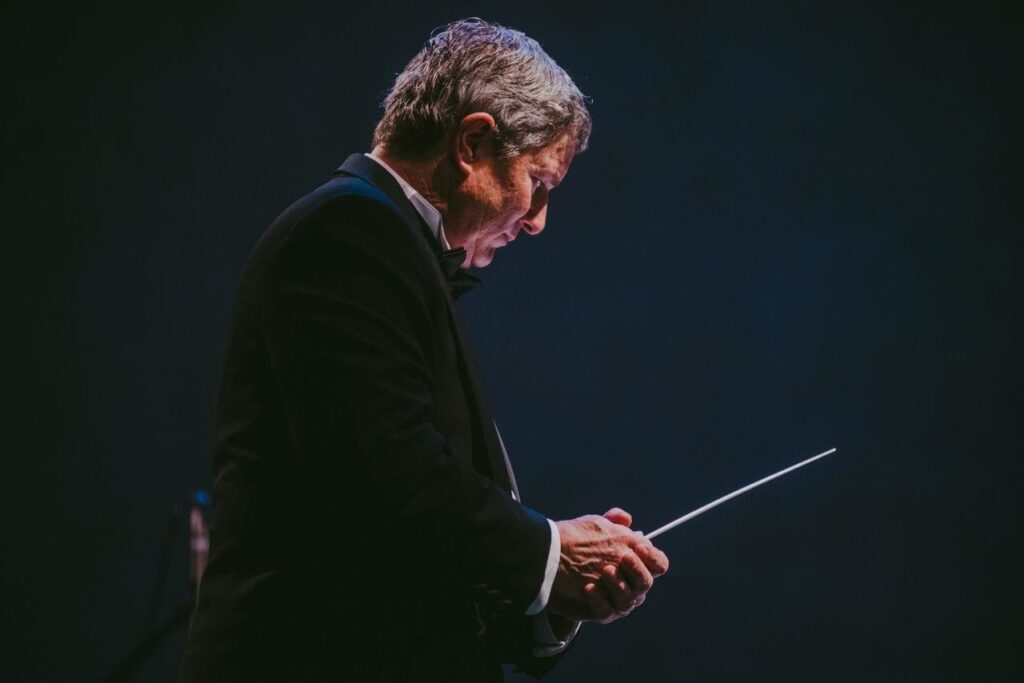Knickerbocker CO marks Earth Day among the palms with belated premiere

The first Earth Day took place in April 1970, and 50 years later, the conductor and environmentalist Gary S. Fagin was ready with a commemorative concert titled “Music of Our Sphere.” But Mother Nature had other plans.
One month before the anniversary, a virus swept the globe and halted all concerts, including the one promoting a harmonious relationship between humans and the natural world.
On Saturday, that concert finally took place, three years late, in the Winter Garden at Brookfield Place in lower Manhattan, as Fagin led his Knickerbocker Chamber Orchestra and solo singers in nature-themed music by John Luther Adams, Copland, Mahler, and Weill. The program culminated in the world premiere of Fagin’s own composition, In Every Grain of Sand, a cantata on texts from the Bible, environmental writer Rachel Carson, and NASA scientist James Hansen.
The audience sat in folding chairs or perched on the grand terraces and stairs of the indoor venue, peering around tall palm trees that seemed to be doing well in this unnatural environment. At concert’s end, Fagin urged listeners to get up and dance to the closing number, Johann Strauss Jr.’s Voices of Spring Waltz.
Although no sound designer was credited in the program, the stage bristled with microphones and a battery of speakers, which pumped a quite credible blend of symphonic sound and vocal solos into the atrium-like space. Conductor Fagin led well-balanced performances that responded imaginatively to each piece’s nature imagery and emotional appeal.
Besides the sung texts, spoken reflections on the environment played a large role in the event. Fagin lost no time reminding the audience that the site of the concert was “reclaimed” from the Hudson River not long ago, and if present climate trends continue, the river might claim it right back.
At mid-concert, the conductor invited onstage the ecologist, author and MacArthur Fellow Carl Safina for a chat about climate change and the role of the arts in getting people emotionally involved enough to do something about it.
Happily, the verbal introductions and interpretations were concise and lively enough not to be a buzzkill for the music. Listening to Adams’s tone poem Become River, it was not hard to cast one’s mind upstate to the headwaters of the Hudson, as a trickle of violin harmonics and a bowed cymbal joined glockenspiel droplets and flute rivulets. Polytonal currents flowed in as the music deepened through the orchestra, eventually roaring and throbbing in cellos, trombones and bass drum, as if driving turbines. This vivid sound picture was worth at least a thousand words about both the fragility and the power of nature.
Copland’s 1954 opera The Tender Land touched on ecological disaster, and celebrated human resilience, with its story of Depression-era farmers scratching a living out of the desiccated ground. Although the opera was received coolly by critics, choruses and an orchestral suite from it have proved durable in concert halls. Fagin and his ensemble gave a vigorous account of the suite Saturday, boldly rhetorical and tenderly lyrical in the early going, then swinging into a hoedown that was part Rodeo and part Petrushka, and finally broadening into a brilliant setting of the opera’s hit chorus, “The Promise of Living.”
Author Safina’s mid-concert sermon on environmental action got an “amen” of sorts from Gustav Mahler, as soprano Rosena Hill Jackson performed “O Mensch! gib acht!” from his Symphony No. 3. “O Man, pay heed” she sang in English, and “O Earth, deep is your pain,” with expressive vibrato and beautifully sustained long phrases in a glacial adagio.
Nathaniel Stampley’s crisp diction and accessible baritone leaned a bit more toward Broadway as he described stars running through God’s fingers “like grains of sand,” in the title song of the Maxwell Anderson-Kurt Weill musical Lost in the Stars. No doubt that phrase caught Fagin’s eye as he assembled this program, which took as its epigraph Rachel Carson’s famous line, “In every outthrust headland, in every curving beach, in every grain of sand there is the story of the earth.”
Fagin incorporated those words in the first and last movements of In Every Grain of Sand, making its world bow Saturday. The first, titled “Subdue the Earth,” set both that Biblical injunction and Carson’s prediction of dire consequences, in a contemporary orchestral and harmonic idiom that seemed to owe something to all the composers who preceded it in this concert.
“In Our Time” ironically juxtaposed scientist Hansen’s historic 1988 U.S. Senate testimony on global warming with senators’ obtuse responses to it in a syncopated quickstep, which eventually slowed to a plea for understanding, darkened by dissonance and the more poignant for falling on deaf ears.
“The Tree of Life” linked more excerpts from Genesis with texts by Carson and Fagin himself in a fervent peroration. Strings and winds poured on the passion, while singers Jackson and Stampley alternated verses of the encomium to nature, then joining in unison on Carson’s iconic line. The cantata ended diminuendo, inviting reflection on nature and one’s place in it.
But then the unmistakable lilt of a Strauss waltz boomed through the vast room, and while the palm trees didn’t swing and sway, many audience members did, putting a festive cap on a challenging and uplifting concert.






